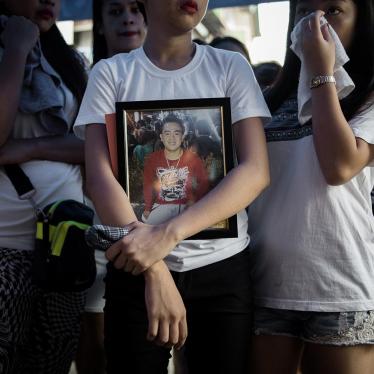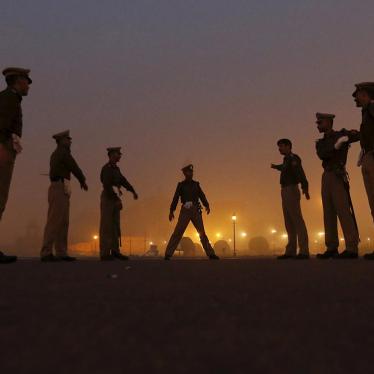(New York) – The Thai Supreme Court’s dismissal of criminal charges against a former prime minister and his deputy for their role in the deadly crackdown on “Red Shirt” protesters in May 2010 is a serious setback for justice in Thailand, Human Rights Watch said today. International human rights law makes clear that official status cannot justify immunity from criminal responsibility for serious human rights violations.
On August 31, 2017, the supreme court ruled that the criminal courts have no jurisdiction to put on trial former Prime Minister Abhisit Vejjajiva and former Deputy Prime Minister Suthep Thaugsuban. The court held that the case can only be investigated by the National Anti-Corruption Commission (NACC), which is responsible for malfeasance cases against officials, effectively ruling out any criminal prosecutions of the two men.
“Letting Abhisit and Suthep off the hook for grave abuses because they held government positions violates basic principles of justice and international human rights law,” said Brad Adams, Asia director. “Despite overwhelming evidence that soldiers killed protesters, medics, reporters, and bystanders during the 2010 upheavals, Thailand’s institutions are failing to ensure justice for those responsible for the bloody crackdown.”
The confrontations between the Abhisit government and the United Front for Democracy against Dictatorship (UDD), popularly known as the “Red Shirts,” took place between April 7 and May 19, 2010, and resulted in at least 98 deaths and more than 2,000 injuries. The Department of Special Investigation (DSI) issued a finding in September 2012 indicating 36 deaths were caused by gunshots fired by soldiers acting on the orders of the Center of the Resolution of the Emergency Situation (CRES). Abhisit set up CRES and placed it under Suthep’s command.
By referring the case to the NACC, the supreme court transformed an important criminal investigation into an administrative inquiry regarding abuse of official positions. The ruling contravenes Thailand’s obligations under the International Covenant on Civil and Political Rights and other human rights treaties to ensure the right to an effective remedy for victims of serious human rights violations, including unlawful killings. A victim’s right to an effective remedy requires that the government take the necessary investigative, judicial, and reparatory steps to redress the violation and address the victim’s rights to knowledge, justice, and reparations. The government is under a continuing obligation to provide an effective remedy; there is no time limit on legal action and the right cannot be compromised even because of a state of emergency.
The court ruling disregarded the fact that the NACC already decided in December 2015 to drop the case against Abhisit and Suthep with respect to their alleged dereliction of duty and failure to review the use of military force that resulted in the loss of lives and the destruction of property. The NACC determined that since the “Red Shirts” protests were not peaceful and some protesters were armed, Abhisit and Suthep’s order to soldiers to use force to reclaim protest sites was in accordance with standard procedure. These rulings effectively mean that there is no longer any way to bring the case against Abhisit and Suthep to the Supreme Court’s Criminal Division for Holders of Political Positions.
Contrary to the NACC’s conclusion that the use of force by the CRES was justified and followed standard procedures, Human Rights Watch found that soldiers used live ammunition starting on the afternoon of April 10, 2010 – killing and wounding protesters, journalists, and bystanders – many hours before armed “Black Shirt” militants, who operated in close proximity with protesters, showed up and fought with soldiers.
Human Rights Watch’s May 2011 report, “Descent into Chaos: Thailand’s 2010 Red Shirt Protests and the Government Crackdown,” documented that excessive and unnecessary force by the military caused many deaths and injuries during the 2010 political confrontations. The high number of casualties resulted in part from the enforcement of “live fire zones” around the “Red Shirt” protest sites in Bangkok, where sharpshooters and snipers were deployed by the CRES. Human Rights Watch also documented that some elements of the UDD, including armed “Black Shirt” militants, committed deadly attacks on soldiers, police, and civilians. Some UDD leaders incited violence with inflammatory speeches to demonstrators, urging their supporters to carry out riots, arson attacks, and looting.
Similar findings were presented in September 2012 by the independent Truth for Reconciliation Commission of Thailand (TRCT), which recommended the authorities “address legal violations by all parties through the justice system, which must be fair and impartial.”
The prospects for justice for victims of the 2010 violence, which have long been bleak, appear to have been totally destroyed. Over the past seven years, successive Thai governments made insufficient efforts to prosecute policy makers, soldiers, and commanding officers responsible for the killings. Yet at the same time, the government has moved to prosecute UDD protest leaders and their supporters with serious criminal offenses.
“Impunity for state-sponsored violence remains the name of the game in Thailand,” Adams said. “It’s beyond outrageous that until today not a single government official, military commander, or soldier has been punished for the many deaths and injuries they inflicted in 2010.”











